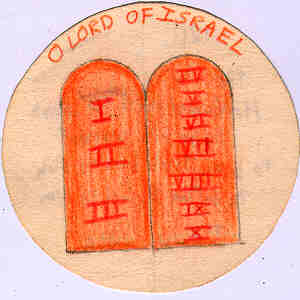Advent 2008 - December 18 - O Adonai
Come O Adonai!

December 18: Seven more days: O Adonai (O Lord of Israel)
O Adonai, et Dux domus Israel,
qui Moysi in igne flammae rubi apparuisti,
et ei in Sina legem dedisti:
veni ad redimendum nos in braccio extento.
(translation from Fr. Britt)
O Adonai, and Leader of the house of Israel, who didst appear unto Moses in the burning bush, and gavest to him the Law on Sinai: COME and redeem us by Thy outstretched arm.
(another version)
O sacred Lord of ancient Israel,
who showed yourself to Moses in the burning bush,
who gave him the holy law on Sinai mountain:
come, stretch out your mighty hand to set us free.
Today, let's consider another of my Christmas favourite shows, "White Christmas". It may strike you as a marvel - that a Jewish composer could render Christmas with such dignity - but Irving Berlin had a very sensitive, indeed, quite sensible, approach to Christmas, and in this musical adventure there are several interesting things to mention. Far more than the Grinch, it speaks about Christmas by emotion and by deep chords of the human heart: of the intense longing for home, of love (even if separated for a time, or even somehow perceived as betrayed), of restoration, of mystery in the winter night - and of snow.
There is the very touching opening scene - in an "advanced area" of the European Theater of World War II - a stage, a tiny band, a couple of performers, and a homely backdrop of a winter-frosted town... but this would have been just as powerful if the rest of the scene had been in the South Pacific - and it is most Chestertonian. GKC points out the powerful attraction of Christmas which abolishes simple and mundane matters like chronology and geography, and puts us immediately "at home"...
We all know that the popular presentation of this popular story, [the Nativity] in so many miracle plays and carols, has given to the shepherds the costume, the language, and the landscape of the separate English and European countrysides. We all know that one shepherd will talk in a Somerset dialect or another talk of driving his sheep from Conway towards the Clyde. Most of us know by this time how true is that error, how wise, how artistic, how intensely Christian and Catholic is that anachronism.I know there are only faint hints of the deeper reality of Christmas in that show, but they are there, and in the hands of a powerful artist such as Berlin, even a hint can evoke a much larger view.
[GKC The Everlasting Man CW2:307]
We see that again in the next scene - the late Advent hilarity in south Florida where the two guy stars meet the two girl stars, which shortly transits into one of my favourite scenes - the meeting on the train in the club car: "Vermont ought to be beautiful this time of year - all that snow." Some wise-guy bible scholars whine about how the first Christmas could not have been in winter, and most certainly did not involve snow... But! When Chesterton visited the Holy Land in 1920, no sooner did he get to Jerusalem than it began to snow. [The New Jerusalem CW20:238]
Then the two couples come to the Pine Tree Lodge - run by a former general who was their commanding officer. And they put on their show... moved not so much by money or even by "show-biz" - but by a certain reverence for him. One thing leads to another - I'm not going to summarise the plot here. But they manage to get a bunch of their former comrades to come and show their support... does television substitute for a star, an old grist-mill-turned-ski-lodge for a cave in the hills by Bethlehem? I do not suggest this is any sort of analogy. But just as a painter can make you think you see one colour by the cunning use of others, or a musician can make you think you hear notes or melodies which are not actually sounding on any instrument.... so too there is a larger view and a warmer tone and a grander harmony to this show.
There is, too, at the very end, the restoration - at least in Betty's eyes - of her "fallen white knight"... and so we hear those most ancient notes of the Protoevangelion... for on Christmas the True White Knight is born. No pun intended.

0 Comments:
Post a Comment
<< Home